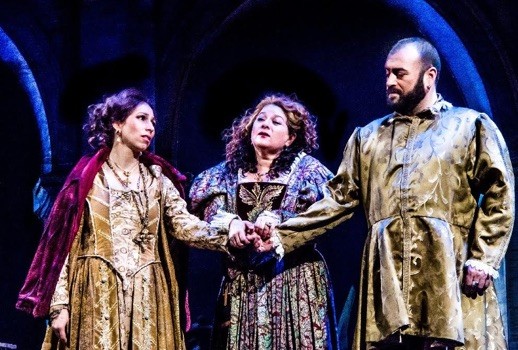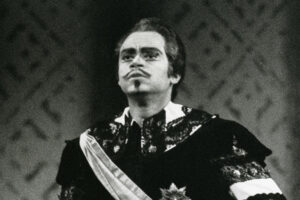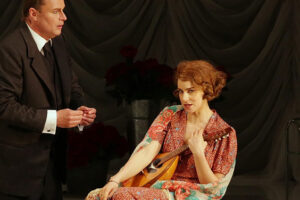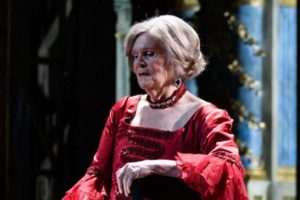
As Enrico Caruso once said to me, “All you need for a good La Gioconda is the six greatest singers in the world and a few dancing elephants.” “Are there that many great singers?” I retorted. He just smiled, pinched my cheek and gave me a sketch he’d done of me while I was sleeping through a Meistersinger in standing room. I guess I should have hung on to it, huh? Be worth something today. Anyway, fortunately, he was wrong: You can do a thoroughly enjoyable Gioconda with far fewer great singers than six, and I heard one in Englewood just last Sunday.
The New Jersey Association of Verismo Opera (henceforth NJAVO) operates at the Bergen Performing Arts Center, the former John Harms Theater in Englewood, a sizable old movie house that could use a paint job but has a warm sound from both stage and orchestra pit. There is also a grinding of something that sounds like metallic cable from the (audience) left side of the stage that was rather atmospheric during the shipboard scenes, less so during the Dance of the Hours.
Verismo Opera has been operating in the provinces for twenty-seven years, and used to do things like Mascagni’s Isabeau and Guglielmo Ratcliff, which would certainly attract my attention. Lately they’ve been hitting the standard Rigoletto and Bohéme circuit. But Gioconda draws my notice wherever it turns up, and even a provincial performance may have many charms.
In this case the sets were very handsome, the orchestra rugged but not ragged (kudos to conductor Lucy Arner!), the ballet (yes! They performed the ballet!), choreographed by Cherylyn Lavagnino, dull but not disgraceful, and the Verismo Opera Volunteer Chorus sounded fine although their movements suggested they had never had a stage rehearsal, ever, for anything. It was fun. A Gioconda should be fun.
With six leads in Gioconda, you can reliably hope that three or four will be worth listening to, or why would they revive the opera? This is music and melodrama but it’s not music-drama.
Sharon Azrieli Perez has a large, warm, Italianate spinto, though there are dry spots and she is not above taking a breath in the middle of Gioconda’s most famous phrases. The wacky story clearly meant a lot to her, which is a principal requirement for this sort of role, and she produced the right tormented wail, if not quite linking the floating high notes to the heartier mid range.
Her stage movements were entertaining and she tossed props about with abandon. She was provincial but intense and I liked her costumes, though an actual rosary might surely have been found instead of the cross dangling from her neck.
Laura Adorno is almost certain to commit one or another of the sins which so pain a Gioconda: Either she is far better looking or far better dressed or her singing outclasses the heroine. Anna Lorraine Tonna chose voice. Her costumes—even the gold party dress—were on the drab side. But her voice! A sizable, beautiful, womanly sound, firmly supported, even throughout its range.
She gave great pleasure in Act II, though she had a tendency to pose front and center and declaim items like “Stella del marinar.” (This was a whimsy of many of the cast and perhaps may be attributed to the straightforward direction of Evelyn La Quaif.) Tonna blended beautifully in all her duets, and would be a credit to any company performing the full-bodied Italian repertory. Galina Ivannikova sang a lush and well-projected La Cieca.
Paolo Buffagni, whom I last heard as Donizetti’s Poliuto, sang Enzo Grimaldi with a gracious if sandy tenor and perfunctory passion. His acting was suited to the crazy story but he lacked that aura of extreme testosterone that distinguishes the finest Enzos. It did not help that the tiny basket of sparks he tossed into his ship at the end of Act II failed to explode in any way, shape or form. I live for that exploding ship. Nathan Resika sang the makeweight role of Duke Alvise with a makeweight voice: Someone has to take the bass line and throw the party in Act III, and Resika filled the empty space.
The figure who drives the story, however, is none of these but wicked Barnaba the spy. Youngjoo An, a fine young baritone, projected a dark, beautiful sound with the greatest of ease, pronouncing his words clearly and carrying a mandolin when the libretto called for him to do so. An is also goodlooking and a lively actor—but he’s no Barnaba. There was no malevolence in his delivery, no sarcasm, no greasy lust. Too, he had a smile on his face throughout the opera’s shenanigans: Barnaba as merry sprite rather than lecherous devil.
Quite aside from the fact that his looks made Gioconda’s reluctance to submit to him a bit of a puzzle (how bad could it be, really?), he was a Barnaba lacking monstrosity. “O Monumento” was a pleasure to the ear and “Pescatore” a joyful folk waltz, but the repulsive fellow who gloats behind the words was nowhere in evidence. What a charming Don Carlo in Ernani he would be! (I thought), and I’ll bet he sings a suave Marcello.
But it was Gioconda, all of it, sung and played with style and vigor, and that is just what a provincial opera company ought to provide.

























Comments